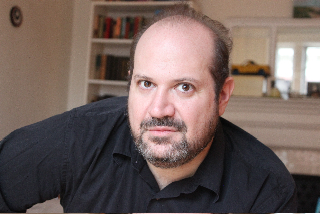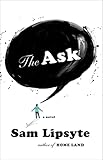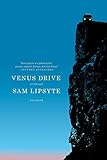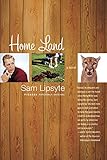 On a Saturday night in April, Sam Lipsyte is at KGB Bar in Manhattan, reading from his new novel The Ask, which everyone from book critics to blogosphere lit nerds have heaped with praise in the eight short weeks since its publication. Each time Lipsyte mentions the character named Vargina, the crowd erupts with cackles and guffaws.
On a Saturday night in April, Sam Lipsyte is at KGB Bar in Manhattan, reading from his new novel The Ask, which everyone from book critics to blogosphere lit nerds have heaped with praise in the eight short weeks since its publication. Each time Lipsyte mentions the character named Vargina, the crowd erupts with cackles and guffaws.
Fast forward to the present. Exactly six months after the release of The Ask, sales are strong, it sits proudly on featured tables in bookstores, and every lit nerd that you know is raving about it. They—and everyone else gaga over The Ask—fall for the novel’s voice in a matter of sentences.
That voice comes from the narrator and protagonist of The Ask, Milo Burke, and many have confused this entertaining font of rage for Lipsyte himself. Lipsyte is a far cry from his antihero, but that’s why they call it fiction. And this time, Lipsyte’s fiction has catapulted him to a height of fame and success that he had never reached before, though his longtime readers insist the talent was always there, waiting to get noticed.
Milo is an angry fuckup who is disillusioned with the arts fundraising department of the New York college (he calls it “Mediocre University”) at which he works and, by the end of the first chapter, has already proven it by giving one spoiled arts brat a verbal beating that Milo tells us “there is no point in repeating.” The onslaught gets him fired, though he is soon given a second chance dependent on his success with the “ask,” which is business lingo for a rich donor.
The big ask turns out to be an old college friend, now turned wealthy sleaze, named Purdy Stuart. Milo must wring Purdy dry for a huge donation to the Mediocre U. arts program. Poor Milo—and the reader, along for the calamitous ride—spends the rest of the book leaping through hoops for the potential donor.
Milo speaks in a furious invective that is somehow as endearing as it is caustic and vulgar. His lexicon is the resentful vocabulary of a failure—one with a hilariously dirty mouth. On the page, it reads like a personal screed, angrily dictated into a recorder. When read aloud, it’s even more effective. People at his readings listen with devilish grins, like they’re being naughty, indulging in a bit of shared misbehavior.
 Lipsyte reads from The Ask in a different voice from his own, loud and declarative, imitating the different voices perfectly. With each raucous sentence, tangled in swear words and name-calling, Lipsyte brings his character to life, and readers form a real relationship with Milo.
Lipsyte reads from The Ask in a different voice from his own, loud and declarative, imitating the different voices perfectly. With each raucous sentence, tangled in swear words and name-calling, Lipsyte brings his character to life, and readers form a real relationship with Milo.
Milo’s creator is different. He’s calm, collected, and friendly. He converses in a soft, earnest tone. He makes direct eye contact and holds it. He’s an easy, fuzzy presence. But in congratulating his newest work—caught up in their love for its protagonist—reviewers seem to have taken Milo as a direct surrogate for Lipsyte himself. “Yeah, some people seem to think I’m Milo,” says Lipsyte with gentle reproach but no sign of frustration. “A lot of people thought I was the guy in the last book, too. And they thought I was the guy in some of the short stories.”
A review of The Ask by Jennifer Schuessler in the New York Review of Books garnered particular frustration from Lipsyte’s literary peers. Schuessler calls Lipsyte the “poet laureate of overeducated American loserdom.” Similarly, a New York Magazine profile begins by encouraging “you schmoes of America” and “sad sacks in sweaters” (those with “rampant neck beard[s]”) to, “rally ‘round your bard!” The tone of pieces like this suggests a presumption that Lipsyte is one of the very men about whom he writes—that his characters are all slightly altered stand-ins for Sam Lipsyte.
“As far as some reviewers are concerned,” says Alex Abramovich, one of Lipsyte’s best friends, “Sam is modeling each character after his life. And that’s a stupid conclusion.” Abramovich and his friends welcomed Lipsyte into their circle with open arms, and are, in a sense, the reason he moved to Astoria.
Lipsyte is a large man, a bit soft around the edges, but he doesn’t seem out of shape. As it turns out, he was a star shot-putter in high school. “Look,” Abramovich sums up, “the main difference between Sam and all of his characters is that Sam has never been a loser at anything he’s ever done in his life. Have you read his sentences? He’s clearly one of God’s winners on this earth. He’s just too fucking charming to be a loser.”
To be fair, there are surface similarities between Lipsyte and his character. Both men are Jewish. And the “Jewish question,” as it turns out, hits a nerve for Lipsyte in curious ways.
“I’m not observant at all, but I think about being a Jew all the time,” says Lipsyte. “And I write characters that have a similar condition.” Indeed, The Ask isn’t really a Jewish novel, but there are, throughout its pages, tinges of the Jewish experience. For one thing, Milo routinely kvetches over his decision to not have his son circumcised.
Meanwhile, his son, Bernie, has his own obsession—more age-appropriate—with the extra tubing. “Do superheroes have foreskins?” he asks his dad. “Does Goliath have a foreskin?” Lipsyte, as is his talent, turns a meaningful family moment into comedy just in time: “Not for long,” Milo answers. “Not when David’s done with him.” When Bernie asks who David is, Milo tells him, “A foreskin collector.”
But apart from these brief mentions—allusions to Milo’s inner Jew—the character does not outwardly act like one of the tribe, and Lipsyte isn’t interested in writing a Jewish novel. “It was done,” he declares. “There was a whole generation that dealt with that. I’m not going to say, Oh, I’m Jewish and people really like books about Jewish stuff, so I should write something that has to do with Jewish stuff. That’s not really going to get you anywhere.”
 Nevertheless, there are those who see deeply entrenched Jewish themes in Lipsyte’s work. Once, a decade ago, a friend of his ended up on a panel for some sort of Jewish literary prize. Lipsyte’s book of short stories, Venus Drive, was nominated, and according to his friend, one of the panelists said during a discussion, “Why are we even considering this one? There’s barely any Judaism in it.” Lipsyte’s friend responded: “Are you kidding me? It’s like the most Jewish thing I’ve ever read.”
Nevertheless, there are those who see deeply entrenched Jewish themes in Lipsyte’s work. Once, a decade ago, a friend of his ended up on a panel for some sort of Jewish literary prize. Lipsyte’s book of short stories, Venus Drive, was nominated, and according to his friend, one of the panelists said during a discussion, “Why are we even considering this one? There’s barely any Judaism in it.” Lipsyte’s friend responded: “Are you kidding me? It’s like the most Jewish thing I’ve ever read.”
Another link between Lipsyte and Milo: they both have five-year-old sons. In The Ask, Milo says of his kid: “Bernie was a beautiful boy. Good thing, too, as he’d become an expensive hobby. Preschool, preclothing for the preschool. Then there were the hidden costs, like food.” When this line is read aloud to Lipsyte, even he can’t help but laugh. Yeah, he wrote it, but it’s damn funny. Yet suddenly, he gets very serious and says, “I think Milo also deeply loves his son.”
When the progressive, hippie-taught “school” that Bernie attends shuts down and Milo must spend entire days with Bernie, his fatherly love does shine through. Lipsyte has fond memories of walking through Astoria with his own son, early inspiration for scenes in which Milo strolls through Queens with Bernie, chiding him to stop playing with trash from the street.
Lipsyte says that someone once asked him if having kids would change his writing. “Well, I hope so,” he told the guy. “It would be kind of weird if it didn’t.” He chuckles, remembering this.
Abramovich feels that Lipsyte’s affability is a main cause of his friend’s newfound mega success. “Sam had a huge log built up of people who adore him,” he says. “He’s just the warmest, most generous and likeable person. And this isn’t boilerplate bullshit; this is true. One thing is that he never says ‘no’ to anyone. But another is that he’s really doing the work.”
Commitment is what the young writer Tao Lin, who has done readings with Lipsyte, also points to. “Everyone I know feels that he really ‘went for it’ with this book,” Lin wrote over Google chat in May. “Which explains the ‘mad coverage’ it’s getting.”
Lipsyte has earned a stellar reputation among other writers, even if it took reviewers longer to hop on board. On the evening he read at KGB, the author John Wray, who has been lauded for Lowboy, read before him. Wray announced, “I was going to read from Lowboy until I realized I’d be reading with Sam Lipsyte, and well, he’s very funny. So I’m going to read something a little goofier, with aspirations toward comedy.” His offering wasn’t nearly as funny as what Lipsyte read, but it was a valiant attempt.
Lipsyte acknowledges the connections he has to Milo. “I think we have many selves and there may be a version of me inside that sort of has the same thoughts as him,” he says about his crude hero. “I don’t necessarily wallow in the bitterness, but his way of looking at the world isn’t alien to me. I think he’s often pretty clear-sighted.”
Then, inevitably, he teases himself: “Maybe I’m just making up friends for me to have.” But the happy truth is that he doesn’t need to make up friends anymore. For most of his career, he struggled to get noticed. Although The New York Times reviewed all of his books, the consensus is that he was still under the radar, though Lipsyte responds playfully, “I always wonder where the radar is located, ya know?”
Finally, with The Ask, Lipsyte has struck a chord. And people aren’t just praising the book, they’re interested in him as well; twelve major magazines interviewed Lipsyte in March and April. Ever humble, he tries to deny an increase in press. “I’ve always had great response from the people whose opinions I’ve cared about,” he insists. “So in my mind, my work was getting noticed.” Soon enough, though, he folds: “Okay, I’ve gotten more mainstream recognition for this book than my others combined. It’s been a leap in coverage and conversation.”
What excited Lipsyte the most in post-Ask coverage of him has been the fact that in a People magazine feature on which books celebrities are reading, Michael J. Fox mentioned The Ask. Fox said he was enjoying it. “I grew up watching Family Ties, so to see 20-something years later that Michael J. Fox is reading the book, well, I think I can retire now.” Lipsyte is positively giddy when he says this.

 Why did The Ask finally earn him such success? Why not his novels Home Land or The Subject Steve, or his collection of short stories, Venus Drive? “The Ask might be different [from his past work] in that there’s a family at the core of it, a family that’s come apart,” speculates Ben Marcus, a colleague and friend of Lipsyte’s in Columbia’s Creative Writing department. “Perhaps that draws more people in, feels more universal.”
Why did The Ask finally earn him such success? Why not his novels Home Land or The Subject Steve, or his collection of short stories, Venus Drive? “The Ask might be different [from his past work] in that there’s a family at the core of it, a family that’s come apart,” speculates Ben Marcus, a colleague and friend of Lipsyte’s in Columbia’s Creative Writing department. “Perhaps that draws more people in, feels more universal.”
Lipsyte himself is more hard-pressed to wonder about the winning combination. “I think that what happened with this book is that I’ve been working for 15 years, and building something of a readership, and good will among some critics, and I benefited from that,” he guesses. “And the rest is sort of timing.”
In a period of economic stress, political strife, and general apathy, The Ask nails the current malaise, and not in a preachy, tiresome way. It handles the issues that are bugging everyone by acknowledging just that—they’re bugging us. In the case of Milo Burke, they’re pissing him off.
Yet if Milo were just pissed off, he’d be a more grating, whiny character. Instead, his anger is conveyed with humor. “Sam’s humor isn’t sitcom humor,” says Abramovich. “You don’t come up with some wacky situation. His humor is gnarly syntax and juxtapositions, and that’s a hard sell. I think it’s a happy miracle that he’s gotten as far as he has.”
Whether it’s the family focus, his many years’ worth of strong relationships, or the humor that is to thank, Lipsyte’s number has been called at last. What has emerged is a writer who cares about fiction, in a literary climate that continually seems to cast it aside.
Lipsyte read Reality Hunger—perhaps the year’s most discussed nonfiction release, in which David Shields suggests shattering labels like “memoir” or “novel” and simply calling everything a “book”—but Lipsyte is not concerned about the future of the novel. “There’s this constant debate about the novel. Is it dead, has technology rendered it dead, but the novel is a technology,” says Lipsyte. “What the novel can still do that other outlets can’t do is operate on a certain level of language and consciousness and association. There’s so much to do there, and there are still so many possibilities.”
Sam Lipsyte, then, is less ordinary than he seems at first glance. He takes language and twists it, tortures it. He makes you laugh until it hurts and makes you nearly cry, often in the same paragraph that a few sentences earlier had offended you, outraged you. He isn’t sure which other contemporary writers are writing the same kind of books.
“I’m in a tradition,” he says with a furrowed brow, “but I don’t know who else I belong with right now. Maybe I’m the beginning of a new trend.” Whether or not it’s a new trend, Lipsyte is doing something new, bringing something fresh and valuable to the literary table—something seriously funny. And his next work, a book of short stories for FSG, will almost certainly be welcomed with rave reviews.
Correction: Originally, this piece incorrectly stated that Lipsyte had once worked at the New Yorker, and that he was half-Jewish. Those statements have been corrected. We apologize for the error.
[Image credit: Ceridwen Morris]








